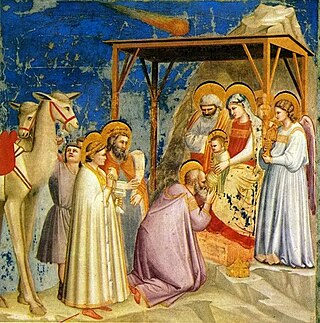
The Star of Bethlehem, or Christmas Star, appears in the nativity story of the Gospel of Matthew chapter 2 where "wise men from the East" (Magi) are inspired by the star to travel to Jerusalem. There, they meet King Herod of Judea, and ask him:
Where is He who has been born King of the Jews? For we have seen His star in the East and have come to worship Him.

Matthew 1:21 is the twenty-first verse of the first chapter in the Gospel of Matthew in the New Testament. Joseph is being spoken to in a dream by an angel. In this verse, the angel tells Joseph to call the child "Jesus", "because he will save his people from their sins".
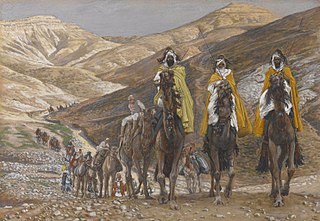
Matthew 2:1 is the first verse of the second chapter of the Gospel of Matthew in the New Testament. The previous verse ends with Jesus being named by his father. This verse marks the clear start of a new narrative, although the use of a quotation from Isaiah 7:14 in Matthew 1:23 is also reflected in the use of four Old Testament quotations in chapter 2.

Matthew 2:2 is the second verse of the second chapter of the Gospel of Matthew in the New Testament. The magi travelling from the east have arrived at the court of King Herod in Jerusalem and in this verse inform him of their purpose.

Matthew 2:3 is the third verse of the second chapter of the Gospel of Matthew in the New Testament. In the previous verse the magi had informed King Herod that they had seen portents showing the birth of the King of the Jews. In this verse he reacts to this news.

Matthew 2:5 is the fifth verse of the second chapter of the Gospel of Matthew in the New Testament. The magi have informed King Herod that they had seen portents showing the birth of the King of the Jews. Herod has asked the leading Jewish religious figures about how to find out where Jesus was to be born. In this verse they tell him.
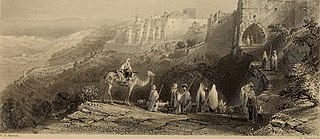
Matthew 2:6 is the sixth verse of the second chapter of the Gospel of Matthew in the New Testament. The magi have informed King Herod that they had seen portents showing the birth of the King of the Jews. Herod has asked the leading Jewish religious figures about how to find out where Jesus was to be born. In this verse they tell him by quoting from the Book of Micah.
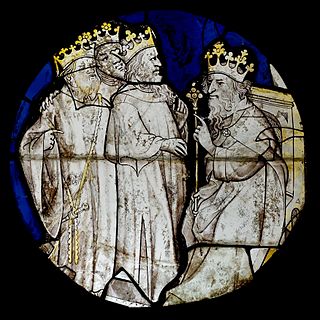
Matthew 2:7 is the seventh verse of the second chapter of the Gospel of Matthew in the New Testament. The magi have informed King Herod that they had seen portents showing the birth of the King of the Jews. Herod has consulted with the leading Jewish religious figures who reported he was to be born in Bethlehem. In this verse Herod again questions the magi.
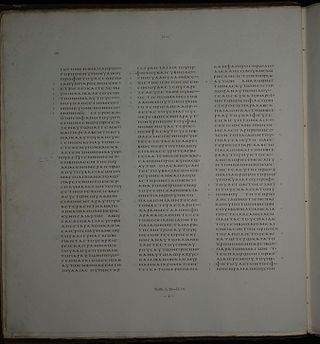
Matthew 2 is the second chapter of the Gospel of Matthew in the New Testament. It describes the events after the birth of Jesus, the visit of the magi and the attempt by King Herod to kill the infant messiah, Joseph and his family's flight into Egypt, and their later return to live in Israel, settling in Nazareth.

Matthew 2:8 is the eighth verse of the second chapter of the Gospel of Matthew in the New Testament. The magi have informed King Herod that they had seen portents showing the birth of the King of the Jews. After consulting with the leading Jewish religious figures Herod sends the magi to find the infant.

Matthew 2:9 is the ninth verse of the second chapter of the Gospel of Matthew in the New Testament. King Herod has dispatched the magi to Bethlehem to find the infant Jesus. In this verse they follow the Star of Bethlehem to find the infant.

Matthew 2:10 is the tenth verse of the second chapter of the Gospel of Matthew in the New Testament. The magi, dispatched by King Herod, have been shown the location of the infant Jesus by the Star of Bethlehem. In this verse they react to this.

Matthew 2:11 is the eleventh verse of the second chapter of the Gospel of Matthew in the New Testament. The magi, dispatched by King Herod, have found the small child Jesus and in this verse present him with gifts in an event known as the Visit of the Wise Men. In art, is traditionally referred to as the Adoration of the Magi.

Matthew 2:12 is the twelfth verse of the second chapter of the Gospel of Matthew in the New Testament. The magi, dispatched by King Herod, have found and paid homage to the Infant Jesus. In this verse this they return home rather than to Herod.
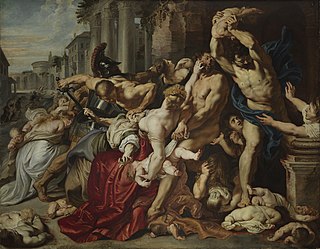
Matthew 2:16 is the sixteenth verse of the second chapter of the Gospel of Matthew in the New Testament.

Matthew 2:20 and 2:21 are the twentieth and twenty first verses of the second chapter of the Gospel of Matthew in the New Testament. The young Jesus and the Holy Family are in Egypt. An angel has just informed Joseph that King Herod, his persecutor, is dead. In this verse the angel gives him further instructions. The wording of this verse is extremely close to that of Exodus 4:19.
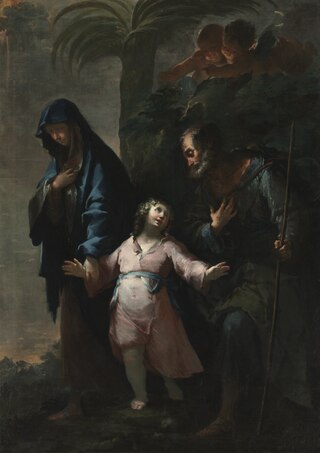
Matthew 2:23 is the twenty-third verse of the second chapter of the Gospel of Matthew in the New Testament. The young Jesus and the Holy Family have just returned from Egypt and in this verse are said to settle in Nazareth. This is the final verse of Matthew's infancy narrative.
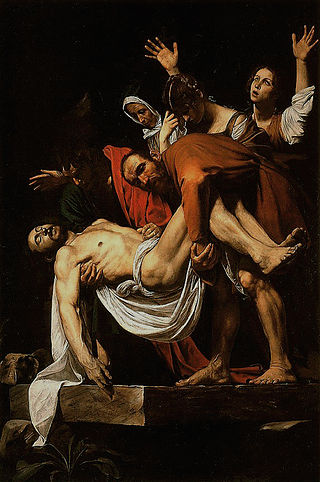
In the New Testament, the Sanhedrin trial of Jesus refers to the trial of Jesus before the Sanhedrin following his arrest in Jerusalem and prior to the trial before Pontius Pilate. It is an incident reported by all three Synoptic Gospels of the New Testament, while the Gospel of John refers to a preliminary inquiry before Annas. The gospel accounts vary on a number of details.
Matthew 28:12 is the twelfth verse of the twenty-eighth chapter of the Gospel of Matthew in the New Testament. This verse is part of the resurrection narrative. In this verse the guards of the tomb, after being present for an angel hearkening the resurrection, are bribed by the priests to lie about what they saw.

Matthew 27:11 is the eleventh verse of the twenty-seventh chapter of the Gospel of Matthew in the New Testament. This verse brings the narrative back to Pilate's Court, and the final trial of Jesus.



















